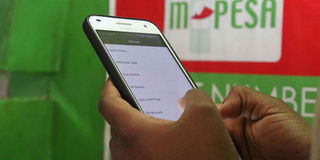The future lies in innovation, and both can be African

A customer using mobile banking service M-Pesa. PHOTO FILE | NATION MEDIA GROUP
What you need to know:
- The next technological wave will usher in artificial intelligence and blockchain capabilities that will make additional jobs redundant.
- Mobile banking continues to flourish in the continent after it was first mastered through the M-Pesa platform.
Not a single week passes without some dramatic news on the impact of technology in our lives. Such impact is obviously not new.
Many times before, the rhythm of change has accelerated, thanks to major technological discoveries such as printing, electricity or combustion engines.
Some would argue that the current technological innovation does not significantly deviate from similar changes in the past.
However, many will agree that something much bigger is afoot.
DEVELOPMENT
Growing up, negative perceptions abounded about Africa’s long-term development prospects.
We indulged in discussions about aid effectiveness, poverty reduction or food insecurity.
Economic development was never part of the menu of options, up until the turn of the century.
And then, almost like a tornado, the faith of most African economies started to get into a different gear.
This change of perceptions was driven by favourable commodity prices, drastic debt reduction, improved macro-economic performance and strong internal demand fuelled by demographic shifts.
TRANSFORMATION
The “Africa rising” narrative took root. Africans started to dream about possibilities.
New partners, such as emerging economies, comforted the notion that the continent could now be a more significant contributor to a global scale up.
Structural transformation entered the vocabulary of African policymakers intent on accelerated industrialisation.
It did not last forever, though. As soon as commodity prices and demand started to look south, the usual doubts about the continent’s future re-emerged.
What’s new? A couple of things.
JOBS
It is difficult to explain why certain commodities and their exports occupy such a large proportion of formal economic transactions; but such is life.
What is significantly different, though, is the threat to change such an economic structure brings into, say, an industrialised economy.
This, at a time when the world is adjusting to a wave of technological innovations that threaten traditional manufacturing and the corresponding global value chains.
Whether we like it or not, manufacturing chains will continue to necessitate less and less labour, thanks to more efficient machines, automation and “robotisation”.
Furthermore, the next technological wave will usher in artificial intelligence, 3-D printing and blockchain capabilities that will make additional jobs redundant.
MOBILE BANKING
Any latecomer into industrialisation has to face poor infrastructure, skills deficits, complex intellectual property or over-regulated trade norms.
Africa is not a desert when it comes to innovation. There are examples of homegrown impactful technological innovations in finance, agriculture and healthcare.
Mobile banking continues to flourish in the continent after it was first mastered through the M-Pesa platform.
Africa is already known for its frugal innovation. The creativity of business solutions found in its informal sector baffles many analysts.
The trouble with this good news is that the opportunities are not large job generators. But they do show African talent.
INNOVATION
Africa possesses one potential asset above every other region of the world: the youthful demographic.
With young people increasingly taking over the workforce, and expected to be younger than China or India by 2034, and if this youthfulness is transformed from potential into real asset, the negativity and settled perceptions about the future of Africa will change dramatically.
Arab Bank for Economic Development in Africa (BADEA) is at the forefront in harnessing this youthful energy to unlock the continent’s potential.
BADEA is sponsoring The Economist Innovation Summit in Nairobi to discuss how to ensure Africa’s future is intertwined with innovation.
For that to happen, we will need to put our young Africans at the forefront.
Sidi Ould Tah is the Director-General of the Arab Bank for Economic Development in Africa.




